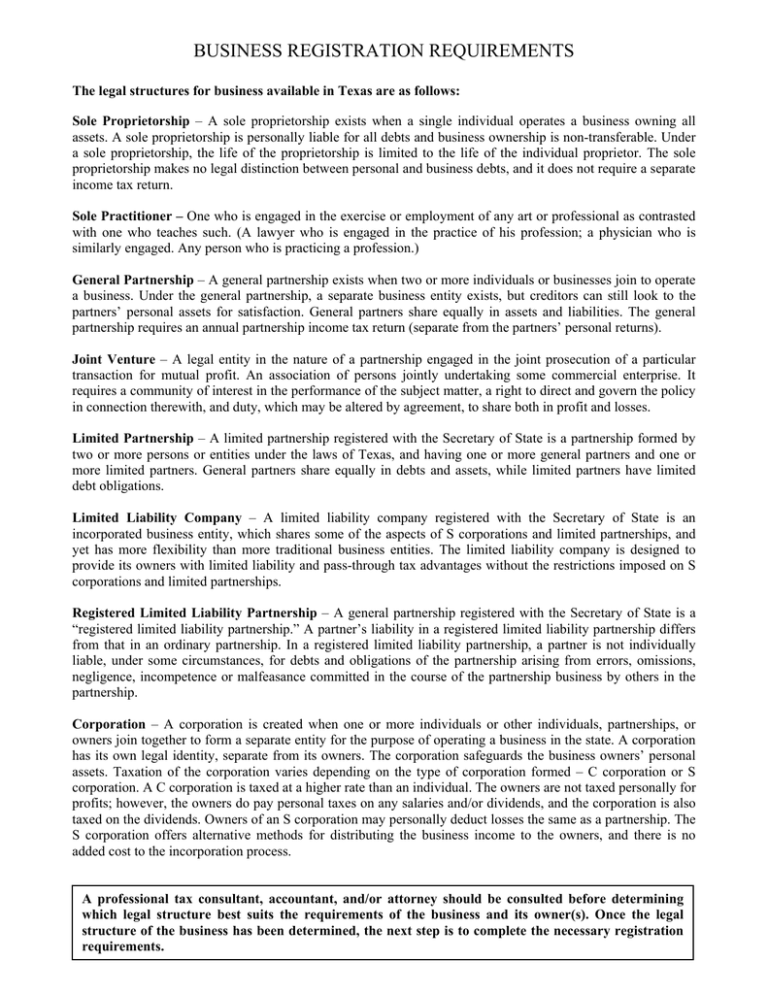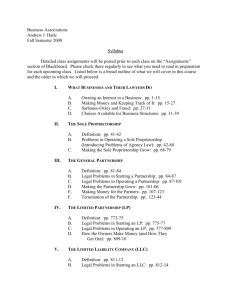BUSINESS REGISTRATION REQUIREMENTS
advertisement

BUSINESS REGISTRATION REQUIREMENTS The legal structures for business available in Texas are as follows: Sole Proprietorship – A sole proprietorship exists when a single individual operates a business owning all assets. A sole proprietorship is personally liable for all debts and business ownership is non-transferable. Under a sole proprietorship, the life of the proprietorship is limited to the life of the individual proprietor. The sole proprietorship makes no legal distinction between personal and business debts, and it does not require a separate income tax return. Sole Practitioner – One who is engaged in the exercise or employment of any art or professional as contrasted with one who teaches such. (A lawyer who is engaged in the practice of his profession; a physician who is similarly engaged. Any person who is practicing a profession.) General Partnership – A general partnership exists when two or more individuals or businesses join to operate a business. Under the general partnership, a separate business entity exists, but creditors can still look to the partners’ personal assets for satisfaction. General partners share equally in assets and liabilities. The general partnership requires an annual partnership income tax return (separate from the partners’ personal returns). Joint Venture – A legal entity in the nature of a partnership engaged in the joint prosecution of a particular transaction for mutual profit. An association of persons jointly undertaking some commercial enterprise. It requires a community of interest in the performance of the subject matter, a right to direct and govern the policy in connection therewith, and duty, which may be altered by agreement, to share both in profit and losses. Limited Partnership – A limited partnership registered with the Secretary of State is a partnership formed by two or more persons or entities under the laws of Texas, and having one or more general partners and one or more limited partners. General partners share equally in debts and assets, while limited partners have limited debt obligations. Limited Liability Company – A limited liability company registered with the Secretary of State is an incorporated business entity, which shares some of the aspects of S corporations and limited partnerships, and yet has more flexibility than more traditional business entities. The limited liability company is designed to provide its owners with limited liability and pass-through tax advantages without the restrictions imposed on S corporations and limited partnerships. Registered Limited Liability Partnership – A general partnership registered with the Secretary of State is a “registered limited liability partnership.” A partner’s liability in a registered limited liability partnership differs from that in an ordinary partnership. In a registered limited liability partnership, a partner is not individually liable, under some circumstances, for debts and obligations of the partnership arising from errors, omissions, negligence, incompetence or malfeasance committed in the course of the partnership business by others in the partnership. Corporation – A corporation is created when one or more individuals or other individuals, partnerships, or owners join together to form a separate entity for the purpose of operating a business in the state. A corporation has its own legal identity, separate from its owners. The corporation safeguards the business owners’ personal assets. Taxation of the corporation varies depending on the type of corporation formed – C corporation or S corporation. A C corporation is taxed at a higher rate than an individual. The owners are not taxed personally for profits; however, the owners do pay personal taxes on any salaries and/or dividends, and the corporation is also taxed on the dividends. Owners of an S corporation may personally deduct losses the same as a partnership. The S corporation offers alternative methods for distributing the business income to the owners, and there is no added cost to the incorporation process. A professional tax consultant, accountant, and/or attorney should be consulted before determining which legal structure best suits the requirements of the business and its owner(s). Once the legal structure of the business has been determined, the next step is to complete the necessary registration requirements.







